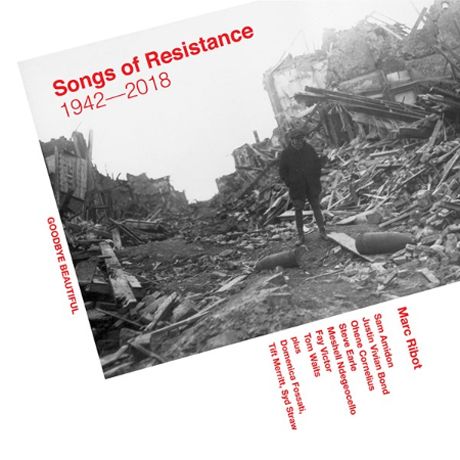Arts
You are here
'Songs of Resistance 1942 – 2018' Review

December 17, 2018
Marc Ribot may not be a household name in the music world, though fans of rock and the New York avant-garde music scene have surely heard is work. With a career almost hitting its 5th decade, Ribot has released 25 solo albums, was the frontman for both Los Cubanos Postizos and Ceramic Dog, and has been a session musician for Tom Waits, Elvis Costello, and the Black Keys, just to name a few. His latest album, ‘Songs of Resistance 1942 - 2018,’ is both a bleak and inspiring and guitar-driven folk dive into the rich canon of protest music that exists internationally, as well as a few original pieces. The album was inspired by the rise of Trump, as well as the far right seen around the world. “I am alarmed by Trump and the movement he’s part of,” Ribot reports in a press release for the album. “I’ve spent a good chunk of my life running around the world on tour—I’m kind of an accidental internationalist—and I see that he’s not an isolated phenomenon. And if we don’t deal with what is going on, it is going to deal with us.” For Ribot, songs can be a key marker in creating a unified voice. “Songs can also remind us that we’re not alone spiritually or historically.” Much as we are seeing the rise of of the far right in Brazil, Canada, Britain, the US, and many other countries, it is important to listen to those voices who sang before and use them to help build for today’s struggle.
As mentioned above, the album draws on international musical traditions of anti-fascist anthems. The handful of interpretations are drawn from US civil rights and gospel hymns, the WW2 Italian partisans, and Mexican anthems. The album opens with the US-rooted, and decidedly free-jazz inspired “We are Soldiers in the arm,” in which vocalist Fay Victor seemingly announces her dedication to the movement over the cacophony of drums and saxophones around her. The next track is easily one of the highlights of the album, a haunting rendition of “Bella Ciao” featuring Tom Waits. The sparse banjo and guitar ebb and flow between Waits’ rattling performance. The song was also chosen as the album’s first single. “Mussolini’s voodoo economics led Italy into a generation of poverty and a senseless war with hundreds of thousands of Italian casualties—including over 30 thousand Partisans,” Ribot explains of the songs origins. “This song tells the story of one of them. At a tender moment when he or she is saying goodbye to her lover (Bella Ciao=goodbye, beautiful) and trying to imagine what it means to fight for freedom.
Other album highlights include a version of “Rata de dos Patas” which takes the original Spanish lyrics in which a spurned lover is comparing their ex-lover to all kinds of untrustworthy animals, and adds in rap sections targeting Trump as well as soundbites featuring many of Trump’s racist remarks. The impactful “The Militant Ecologist” is based on the Italian work “Fischia Il Vento,” and features beautiful vocals in which our hero marches on for her greater cause. Another amazing track is “Knock that Statue Down,” which focuses on the progressive removal of statues commemorating racist US figures. “We heard some fool shouting something about the heritage of a Mr. Robert E. Lee.” Sings Ribot in the song’s first verse. “I said you better find someone else to be proud of because we’re sick and tired of white supremacy.” The chorus changes with the song’s progression, but generally carries the lyrics “We’re gonna knock that statue down / we’re gonna knock that no good statue down.”
There simply isn’t a weak track on the album, all due to the inspiring content and inspired arrangement and care given to each song. Some songs are quiet and focus on the emotional weight of fighting for freedom, while others are energetic and act as musical lightning-rods for inspiring action. A portion of the album’s proceeds are donated to The Indivisible Project, an organization that helps other groups resist and fight the Trump agenda through social and legislative efforts. Ribot has been an activist and musician for many years, and hopes that this album can help inspire new people to become involved in anti-fascist resistance and help keep the flame burning for those who continue the fight. “When democracy is threatened, people who value it need to work together to defend it. When basic human rights are threatened by racists, sexists, and homophobes, we need to respond. I don’t know what 'the answer' is: but I know this: If we’re not able to work together, we’re going to get our asses kicked separately.” Songs of Resistance serves as an inspiring piece for those shout “No platform for racists, no platform for fascists!”
Section:
Topics:









